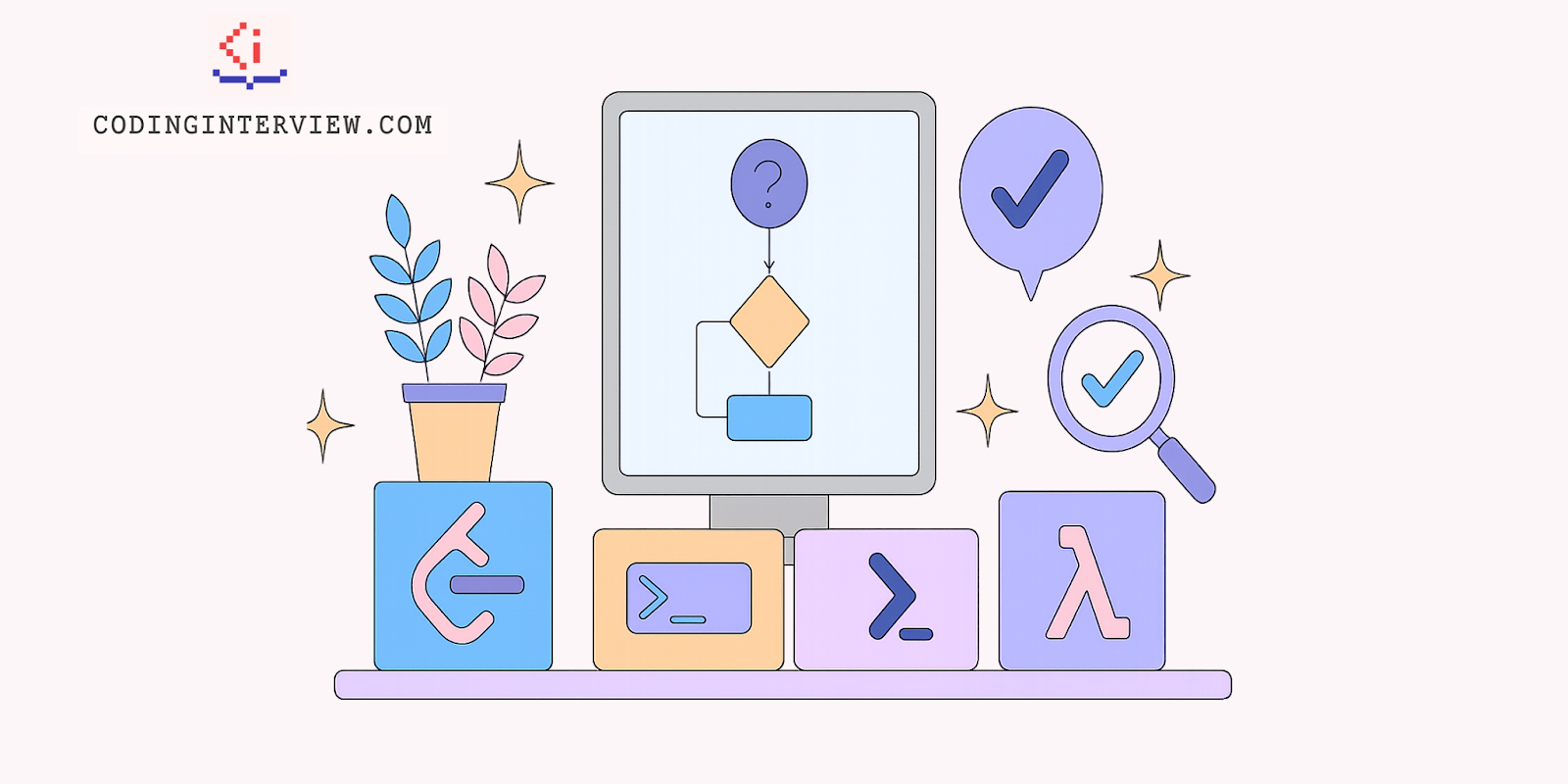You solved a few LeetCode problems, tried grokking the coding interview course, and watched tutorial videos, yet live interviews still feel unpredictable. You want structured practice, timely feedback, and progress you can measure. A coding interview platform gives you that structure and turns scattered learning into a guided journey.
This guide walks you through what these platforms offer, how to pick one, and how to use it day-to-day so you enter each interview with a calm, clear strategy.
Key features to look for in coding interview platforms
Pattern-oriented problem sets
Coding interview platforms that group questions by sliding window, binary search, or dynamic programming help you see repeatable strategies instead of isolated puzzles.
Integrated code runner
A built-in IDE with test cases lets you debug quickly and verify solutions without leaving the browser.
Mock interview scheduling
Live practice with peers or seasoned engineers reinforces communication habits and timing discipline.
Audio or text feedback
Detailed feedback pinpoints gaps in logic, explanation, or edge-case coverage.
Role-aligned tracks
A strong coding interview platform course adjusts depth for entry-level, mid-level, and senior roles, including system design for advanced paths.
Top 10 coding interview platforms
You are looking for a coding interview platform that does more than just test you. You want structure, quality content, hands-on problem solving, and clarity on where to go next. These 10 platforms offer exactly that. Some help you with mock interviews, others with patterns or real feedback. This section breaks down each one to help you choose with confidence.
1. Educative- Grokking the Coding Interview
Educative is a leading platform for coding interview preparation, trusted by thousands of developers for its structured, pattern-based approach to problem-solving. One of its most impactful offerings is the “Grokking the Coding Interview” course — a cornerstone resource designed to help learners break away from brute-force problem grinding.
Rather than overwhelming you with hundreds of isolated problems, this course teaches you how to identify and master 24+ foundational problem-solving patterns that appear repeatedly in technical interviews. These include proven strategies such as Sliding Window, Fast & Slow Pointers, Two Heaps, Top K Elements, and Subsets — enabling you to confidently tackle unfamiliar problems by recognizing their underlying structure.
It’s ideal if you’re early in your prep or feel overwhelmed by LeetCode’s randomness and want a structured, reusable approach to problem-solving.
What you get:
- 24+ coding patterns that simplify hundreds of common problems
- In-browser coding environment with real-time feedback
- 700+ lessons, 390+ quizzes, and challenges across core DSA topics
- Language support for Python, Java, JavaScript, C++, and Go
- Detailed walkthroughs that explain “why,” not just “how”
Pros:
- Pattern-based system improves problem-solving speed and clarity
- No setup required—fully browser-based
- Beginner- and intermediate-friendly, even without prior exposure
- Covers recursion, backtracking, trees, graphs, and more
Cons:
- Doesn’t include live mock interviews or AI feedback
- Best when paired with timed practice tools to simulate pressure
If you want to build foundational coding instincts and stop getting stuck on new problems, this course gives you a repeatable framework that scales from bootcamp to FAANG.
2. LeetCode Premium
Best for mastering volume and company-specific problems
LeetCode Premium offers one of the largest collections of interview questions sorted by topic and company. If you want raw problem-solving repetition, this is one of the most effective coding interview platforms course options out there.
What makes it stand out: The community is extremely active. You learn not just by solving but by reading smart, optimized solutions from others.
Pros
- Huge problem bank with filtering
- Company-specific tags (Google, Meta, etc.)
- Timed contests help simulate pressure
Cons
- No structured roadmap
- It can feel overwhelming for beginners
This is a great supplement once you’ve learned the patterns.
3. Interviewing.io
Best for live, anonymous mock interviews
Interviewing.io gives you the real experience of whiteboard interviews with actual engineers. You stay anonymous and can even get hired directly if you do well.
What makes it stand out: These mocks are as close as you can get to the real thing, especially for senior engineers preparing for FAANG or top-tier companies.
Pros
- Anonymous, low-pressure practice
- High-quality peer and mentor interviewers
- Recording and feedback provided
Cons
- Limited to live sessions
- Requires some experience to get value
It complements any coding interview platform by letting you test your readiness.
4. AlgoExpert
Best for visual learners and curated question sets
AlgoExpert combines video-based explanations with coding environments. It walks you through problems step by step, using diagrams and voiceovers.
What makes it stand out: You see how an expert approaches each problem. This is great if you like seeing thought processes in action.
Pros
- Beautiful UI with explanations
- 160+ questions across difficulty levels
- System design and behavioral add-ons available
Cons
- Less community interaction
- Subscription-based
If you like a polished platform with bite-sized challenges, it’s worth a look.
5. Pramp
Best free platform for peer-to-peer interviews
Pramp matches you with other learners to conduct mock interviews. You take turns being the interviewer and the interviewee, which strengthens your communication skills.
What makes it stand out: It is free and structured. You get real practice without needing to find partners manually.
Pros
- Free and beginner-friendly
- Scheduled mocks with a clear format
- Helps with both technical and soft skills
Cons
- Match quality can vary
- Requires scheduling flexibility
Pair this with a structured coding interview platform for maximum benefit.
6. HackerRank Interview Prep Kit
Best for structured problem sets by topic
HackerRank offers curated tracks focused on arrays, strings, sorting, and dynamic programming. The Interview Prep Kit is a self-paced track designed for brushing up quickly.
What makes it stand out: It’s used by companies, so the environment simulates what you might face in a hiring assessment.
Pros
- Real-world testing interface
- Company-aligned formats
- Free to use
Cons
- Some explanations are shallow
- The forum isn’t as active as LeetCode
Use this to supplement your main prep program, especially if you’re aiming for technical assessments.
7. Experty.io
Best platform for paid mentorship and personalized mock sessions
Experty connects you with experienced engineers who can run system design and coding interviews tailored to your goals.
What makes it stand out: You choose your mentor, pick the type of interview, and get direct feedback.
Pros
- Highly personalized prep
- Real feedback on both code and communication
- Professional interviewer experience
Cons
- Paid sessions only
- Requires more initiative than course-based platforms
This is ideal for late-stage prep when you need targeted polishing.
8. CodeSignal
Best for assessments and real-world coding challenges
CodeSignal is used by companies to assess candidates. Their Arcade section and Certify assessments are interactive and realistic.
What makes it stand out: If you apply to a company that uses CodeSignal, you want to be ready for its testing format.
Pros
- Gamified learning with real-world tests
- Great for developing speed and accuracy
- Offers company-tailored assessments
Cons
- Fewer practice problems than LeetCode
- Less structured guidance
Use it in tandem with a coding interview platform that builds foundational strength.
9. Coursera – Algorithms Specialization by Stanford
Best academic-style course for algorithm fundamentals
This course, taught by Tim Roughgarden, goes deep into algorithm theory. If you like understanding the why behind every solution, it’s an excellent resource.
What makes it stand out: It’s from Stanford and focuses more on foundational concepts than brute practice.
Pros
- University-level instruction
- Strong focus on theory and analysis
- Self-paced with quizzes
Cons
- Not focused on interviews directly
- Requires more math background
This works well if you want to strengthen your base alongside practical prep.
10. Udemy – Master the Coding Interview: Data Structures + Algorithms
Best affordable all-in-one course for beginners
Created by Andrei Neagoie, this course combines lectures, visuals, and walkthroughs. It starts with the basics and builds up to real problems.
What makes it stand out: It mixes instruction, hands-on demos, and interview-focused problems all in one place.
Pros
- Affordable with lifetime access
- Beginner-friendly pacing
- Great community on Discord
Cons
- No interactive coding
- Slower updates on newer questions
It’s a solid foundation if you’re just starting out and want one comprehensive package.
Final thoughts
A coding interview platform turns vague preparation into focused action. You follow structured lessons, practice under realistic conditions, and receive feedback that sharpens both code and communication. Start today by picking one platform, setting weekly goals, and tracking every solve. Discipline, pattern recognition, and mock practice will carry you from the first problem to the final onsite with steady confidence.


